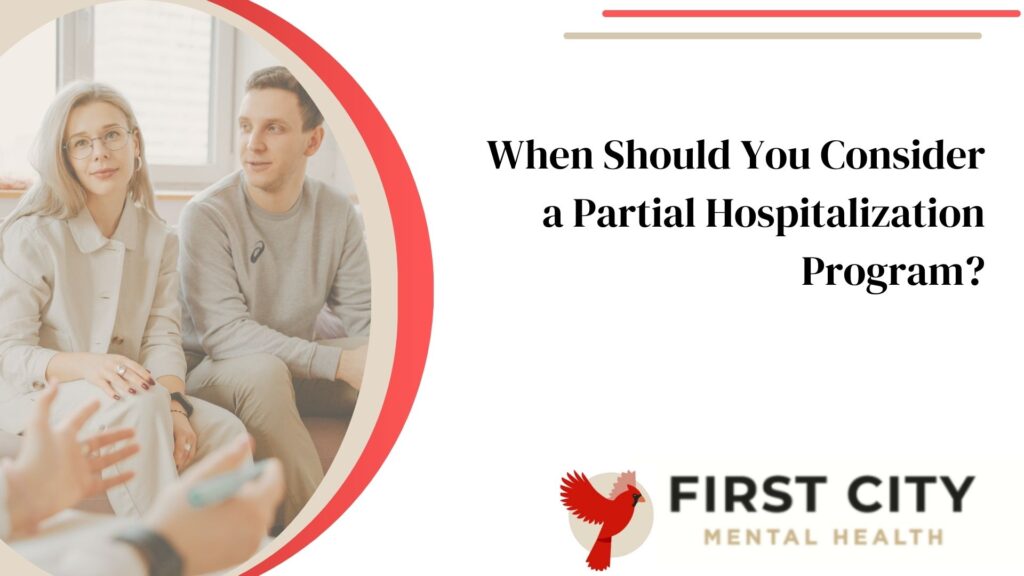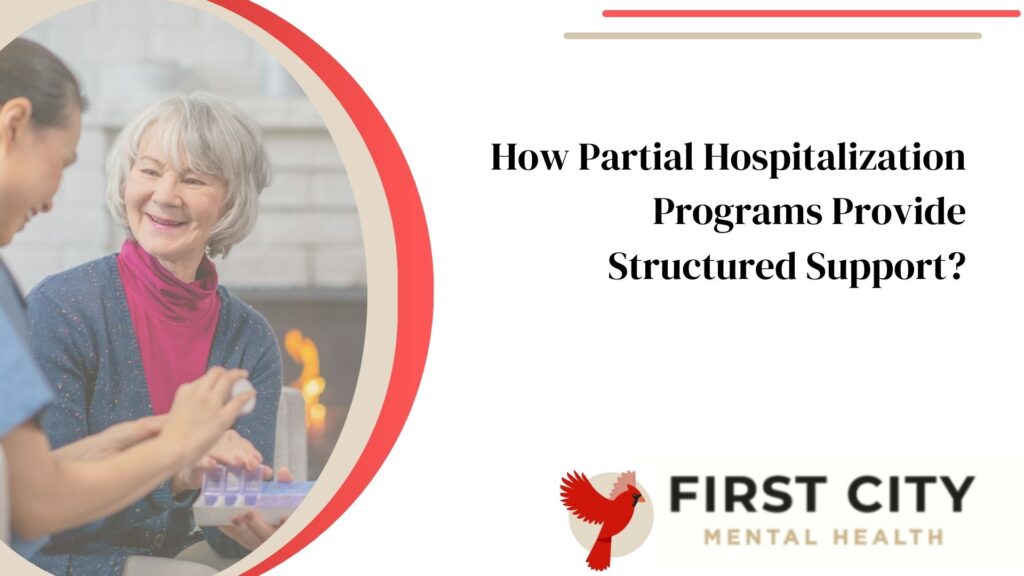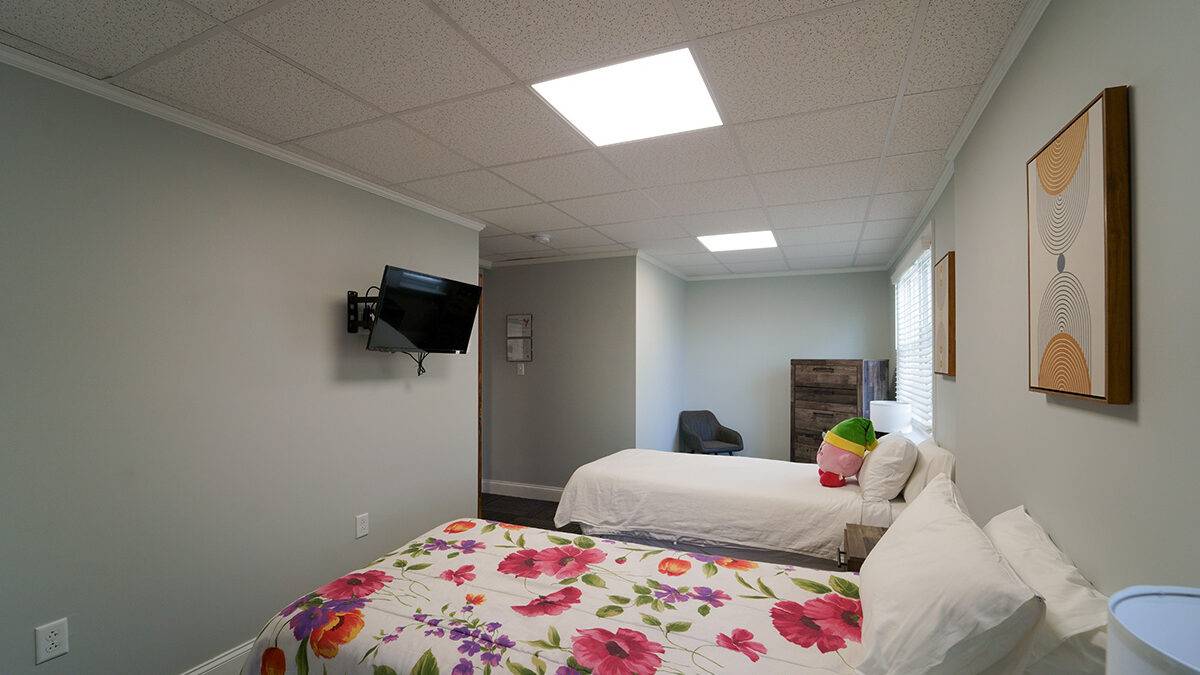
How Reliable are Partial Hospitalization Program for Mental Health Care?
January 27, 2025
What Services Are Offered in a Mental Health Partial Hospitalization Program?
January 27, 2025For many people struggling with mental health issues, finding the right level of care can be challenging. You might have tried outpatient therapy but found it lacking, or perhaps inpatient hospitalization seemed too intense for your needs.
If you’re seeking a practical middle ground to support your recovery journey, a partial hospitalization program (PHP) might be the right choice.
Did you know that PHP typically lasts 30-45 days and offers a blend of intensive treatment and community living? Patients receive structured support through group therapy, individual sessions, and medication management while off-site.
This setup creates a balanced environment conducive to stabilization and reintegration.
In this blog post, we will explore how partial hospitalization programs assist in daily functioning, provide structured support for severe anxiety, and are beneficial for long-term recovery.
You’ll also learn where to find comprehensive options like those in Indiana. Stay tuned!
Key Takeaways
- Partial Hospitalization Programs (PHPs) offer 6-8 hours of daily therapeutic support, including group therapy, individual sessions, and medication management.
- PHPs provide a balanced environment for mental health recovery by allowing patients to live at home while receiving intensive treatment.
- These programs are designed to assist with severe anxiety by offering structured schedules that help stabilize mental health without the need for overnight stays.
How Partial Hospitalization Programs Support Mental Health Recovery?
Partial Hospitalization Kokomo Programs (PHP) offer a structured and intensive form of care that bridges the gap between inpatient treatment and independent living. Patients engage in therapeutic programming for 6-8 hours daily, focusing on group therapy, individual therapy, medication management, and life skills reintegration.
This consistent schedule helps to stabilize mental health conditions while providing essential support for patients transitioning back into society.
A significant advantage of PHP is its holistic approach to recovery. Treatment plans typically include coping strategies developed through dialectical behavioral therapy (D.B.T.), which empowers individuals to manage their symptoms effectively.
This balanced combination of therapies ensures that each patient’s needs are met comprehensively, promoting sustainable mental health improvement.
When Should You Consider a Partial Hospitalization Program?

Individuals who require more intensive treatment than outpatient services but not as intense as inpatient treatment may benefit from a mental health Partial Hospitalization Program (PHP). After completing a residential program, people ready to re-integrate into society should also consider this option.
If someone finds it challenging to manage daily activities due to mental illness, a PHP provides the structured support they need.
Adult patients seeking stabilization before returning to work or school will find the program beneficial. A Partial Hospitalization Program is an essential step from residential care, offering intensive yet flexible treatment options.
With guidance from mental health professionals, patients can participate in comprehensive therapy during the day and return home each evening.
How Partial Hospitalization Programs Help with Daily Functioning?
Choosing to enter a Partial Hospitalization Program mental health (PHP) can significantly improve daily functioning for those grappling with mental health concerns. PHPs provide patients with life skills reintegration, including 6-8 hours of individual and group therapy sessions daily.
These intensive schedules ensure the development of coping strategies that help individuals manage their symptoms more effectively.
Patients benefit from structured support, allowing them to stabilize their mental health while living at home. This balance enables many to return to everyday activities, such as attending school or work, without feeling overwhelmed by their condition.
Medication management offered within PHPs further aids in maintaining stability, ensuring clear pathways towards better functioning in daily life.
How Partial Hospitalization Programs Provide Structured Support?
Partial hospitalization programs (PHP) offer a highly structured environment as a middle ground between residential and outpatient care. Patients engage in therapeutic activities like group therapy, individual therapy, and medication management for 6-8 hours daily.
This intensive schedule helps stabilize mental health while allowing patients to reside at home or in sober housing off-site.
Dedicated treatment teams tailor the daily sessions to meet individual needs and focus on achieving specific treatment goals. “Our mission is to provide the highest levels of care,” emphasizes First City Mental Health.
Each treatment day, excluding holidays, is carefully planned to ensure consistent weekly support.
“The ultimate aim of PHP is to help individuals stabilize their mental health.”
Why Partial Hospitalization Programs Are Ideal for Severe Anxiety?

Indiana Partial Hospitalization Programs (PHP) are highly effective for managing severe anxiety. These programs offer intensive care without requiring overnight stays, which can help reduce the stress of being away from home.
Participants benefit from structured schedules that include individual and group therapy sessions, medication management, and life skills reintegration. Engaging in therapeutic programming for 6-8 hours a day provides consistent support and helps stabilize mental health.
Individuals with severe anxiety often need more care than traditional outpatient services can provide. PHPs bridge this gap by offering comprehensive treatment while allowing participants to live at home.
This balance ensures individuals receive the necessary support to re-integrate into society effectively. With components such as group therapy and medication management explicitly tailored for mental health recovery, these programs create a supportive environment ideal for addressing severe anxiety symptoms comprehensively.
Where to Find Comprehensive Partial Hospitalization Programs?
Finding comprehensive partial hospitalization programs (PHPs) can be straightforward with the right resources. Start by contacting local treatment centers or hospitals, which often provide these day programs.
They enable patients to live at home while attending therapeutic sessions for 6-8 hours daily. For those in Indiana, several reputable facilities offer robust mental health partial hospitalization program options.
Insurance companies and therapists are also valuable sources of information to help determine suitable PHP options. Often, they can refer patients directly and assist in navigating out-of-pocket costs versus insurance coverage.
Many PHPs also include sober or community housing for individuals who prefer a structured environment close to their therapy.
Why Partial Hospitalization Programs Are Beneficial for Long-Term Recovery?
Locating a comprehensive adult partial hospitalization program in Indiana is essential, but understanding its lasting benefits is crucial. Partial Hospitalization Programs (PHP) offer a unique level of care that bridges the gap between inpatient and outpatient treatment.
Patients live at home or in community housing while receiving intensive therapeutic support for 6-8 hours daily. This consistent structure helps individuals stabilize their mental health through group therapy, individual counseling, medication management, and life skills reintegration.
PHPs are designed to support long-term recovery by gradually reintroducing patients to everyday activities. They facilitate smoother transitions back into work or school environments, reducing the risk of relapse.
Individuals can practice coping mechanisms in real-world settings with professional guidance readily available when needed. This balanced approach fosters independence while ensuring ongoing support during critical stages of recovery.
How to Maximize the Benefits of a Partial Hospitalization Program?

Transitioning from the long-term recovery benefits, it’s crucial to understand how to fully take advantage of a Partial Hospitalization Program in Indiana (PHP). Here are some effective strategies to maximize your outcomes.
- Commit Fully to the Program: Attend all scheduled sessions and actively participate in group and individual therapies. Consistent involvement enhances Progress and builds robust coping mechanisms.
- Communicate Openly with Therapists: Be honest about your thoughts, feelings, and challenges during therapy sessions. This transparency allows therapists to tailor treatments effectively.
- Utilize Medication Management Services: For optimal results, follow prescribed medication regimens closely and discuss any side effects or concerns with your healthcare providers.
- Engage in Homework Assignments: Diligently complete any assigned tasks or exercises between sessions. These activities reinforce learning and facilitate recovery outside structured hours.
- Create a Supportive Home Environment: Ensure your living space is conducive to recovery by minimizing stressors and seeking support from family or friends who understand your treatment goals.
- Set Realistic Goals: Work with your treatment team to establish achievable milestones. Clear goals provide direction and motivation throughout the program.
- Monitor Progress Regularly: Track your mental health improvements by journaling your daily thoughts, emotions, and experiences. This can help identify trends or areas needing attention.
- Stay Informed About PHP Policies: Understand the program’s rules and guidelines and what is expected of you as a patient to ensure smooth participation without surprises or setbacks.
- Balance Self-Care with Responsibilities: While attending PHP, continue managing essential duties like attending school or working part-time without overwhelming yourself.
- Seek Financial Assistance if Needed: Explore insurance company coverage options for PHP treatments to manage out-of-pocket costs effectively, ensuring financial aspects don’t hinder participation.
- Access Additional Resources When Necessary: If needed, utilize supplementary services, such as substance abuse treatment programs, alongside PHP for comprehensive care that addresses all relevant issues.
- Evaluate Long-Term Recovery Plans Early On: Start working on post-PHP care plans with therapists early to ensure a seamless transition back into everyday life while maintaining stability.
First City Mental Health’s commitment ensures that individuals receive exceptional care throughout their journey in Indiana partial hospitalization programs, facilitating lasting recovery success.
Conclusion
Partial hospitalization program (PHP) provide intensive mental health care while allowing individuals to live at home. These programs offer structured support through group and individual therapy, medication management, and life skills training.
For severe anxiety or other serious mental health conditions, PHPs can be a lifeline. They help patients stabilize their mental health and reintegrate into work or school settings.
Consider if a partial hospitalization program might meet your needs for effective and supportive care.
F.A.Q.s
What is a partial hospitalization program (PHP) for mental health?
A partial hospitalization program, or PHP, offers intensive treatment for mental health issues during the day while allowing patients to return home at night.
How does a partial hospitalization program in Kokomo work?
In Kokomo, the PHP provides structured therapy sessions and activities that help manage your mental health without needing full-time hospital care.
Will I still be able to attend school while in PHP?
Yes, many programs allow you to continue attending school as long as it doesn’t interfere with your treatment schedule.
Are there out-of-pocket costs for participating in a PHP?
There might be out-of-pocket costs depending on your insurance plan and coverage details. Always check with your provider before starting the referral process.






